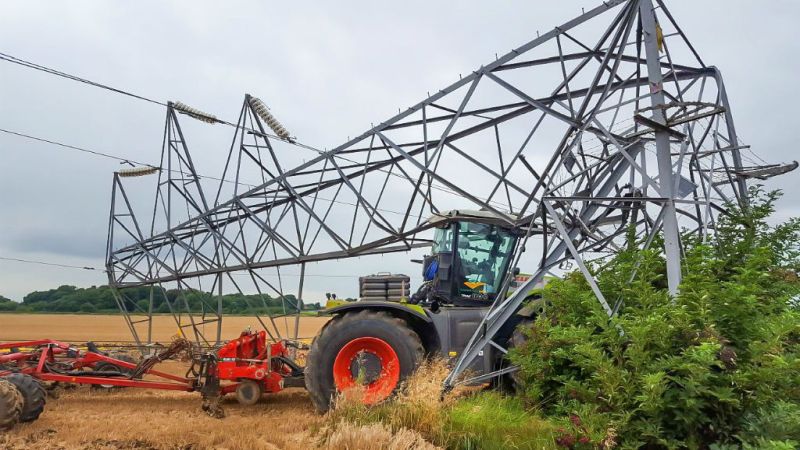
A Nottinghamshire farmer escaped serious injury when his tractor crashed into a pylon while using autosteer, an accident which has triggered a safety reminder when working near overhead lines.
There has been a surge in the number of agricultural accidents involving overhead lines around the UK.
The latest figures show that at least one agricultural accident involving overhead lines is reported every day – up by more than 100 a year, from 263 in 2013 to 378 in 2018.
In the last five years, there have been more than 1,140 near misses involving electricity on farmland.
The driver of the tractor at Flawborough in Nottinghamshire escaped unhurt when his tractor crashed into a pylon while using autosteer last month.
However, this accident has made the UK's largest electricity network operator, Western Power Distribution (WPD), reemphasise that incidents involving electricity endanger life and costs farmers thousands of pounds a year.
In one incident in Nottinghamshire, 1,300 homes were left without power when a tractor crashed into a pylon while using auto-steer.
Eddie Cochrane, WPD Safety Advisor, said that all agricultural accidents involving overhead lines are 'avoidable'.
“By far, the largest number of accidents involving farm workers is caused by machines coming into contact with overhead lines, often leading to injury and even death,” he said.
“But what many farmers may not realise is that, as well as the obvious safety implications, there are almost certainly going to be financial consequences.”
Mr Cochrane added: “The cost of repairing damage to equipment such as poles and pylons is passed on to the farmer and, in some cases, can run into tens or even hundreds of thousands of pounds.”
Due to the progression of data analytics, GPS and remote sensing, most tractors can now map a field, drive themselves and precisely calibrate their movements to minimise wasted fuel, fertiliser or seed.
But most accidents involve farm vehicles fitted with Sat Nav or other automated steering systems, which do not take into account poles, pylons and overhead lines nearby.
Additional risks are posed by objects, such as straw bales or even new buildings, being placed too close to overhead lines.
The warning by WPD follows a string of incidents involving overhead powerlines. Last year, the partners of a Suffolk based farm were ordered to pay out £28,400 after a haulage contractor was killed by an overhead power line strike.
And in 2017, a farmer was ordered to pay almost £100,000 after a man was electrocuted when his crane came into contact with overhead power lines.
